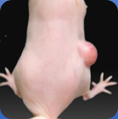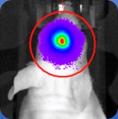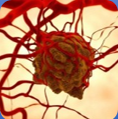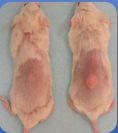Tumor Seeding Types
The transplanted tumor is the essential tool for their study and detection since the existence of transplanted tumor is long-lasting beyond that of the original donor. The information obtained is instant clinical benefits, because the choice of treatment regimen may hinge on the traits of specified cancer as embodied in its life-history. Creative Biolabs is a world leader in the industry of animal models, and with extensive experience and rich expertise, our scientists have developed an ideal platform that includes various types of rodent models in order to offer the most appropriate one for your research.
Tumor Implantation
With the development of human oncology research, plenty of studies were conducted to transmit tumors within and between species by engrafting live tumors or tumor extracts. Various valuable results have been recorded, especially in rodents. Transplanted tumors have made major contributions to cancer biology which would otherwise have been unrealizable, or achievable with great difficulty.
Compared with the "spontaneous" cancers, transplanted tumors are most commonly used for detecting the therapeutic effectiveness of a major and complicated collection of compounds. Transplanted tumors have made significant contributions to cancer biology which would otherwise have been elusive, or difficult to accomplish.
Transplantation sites
Diverse sites have been applied in tumor transplantation including the brain, eye, splenic capsule, ovarian capsule and so on. But among these, intramuscular, intraperitoneal and subcutaneous are the most common sites.
Subcutaneous inoculations are generally used for regular maintenance of most solid tumors; and for ascites growths, the inoculum is placed intraperitoneally.
Creative Biolabs offers various types of tumor seeding rodent models as below:

|
Subcutaneous Models Subcutaneous tumor model is the most popularly assessment system for in vivo efficacy evaluation of novel anti-cancer medicine candidates. |

|
Orthotopic Models Compared with the subcutaneous tumor models, orthotopic models are supposed to be more clinically correlative and better forecasting for drug effect. |

|
Angiogenesis Models Animal model of tumor-associated Angiogenesis is a significant strategy to seek for therapeutic agents of human cancers. |

|
Systemic Models |
Features of Transplanted Tumor
- The spectrum of transplanted tumors carried in mice reflects the range of autochthonous and experimentally produced tumors found in the laboratory.
- Tumors originally of similar histological type may show significant changes in successive transplantation (e.g. some tumors may lose their identity and become undifferentiated).
- Growth rates may vary considerably for tumors of the same histological type.
- Some tumors characteristically metastasize to the lymph nodes or organs distant from the site of tumor inoculation, while others do not.
- The growth patterns of tumors may vary with the histological type or may vary for tumors of the same type.
A variety of animal models are able to realize the evaluation of novel compounds for in vivo anti-tumor efficacy. Equipped with extensive experience and excellent skills, our scientists have developed a well-established platform for various rodent tumor models, aiming at assisting our clients in new anti-tumor drug discovery or any other research on oncology.
In case our services or tumor models displayed on the following pages do not match your demands completely, we would appreciate you to contact us. In view of our extensive specialized knowledge and rich extensive research experience, we are willing to seek out a custom-tailored solution to support your cancer drug research.
For Research Use Only.
